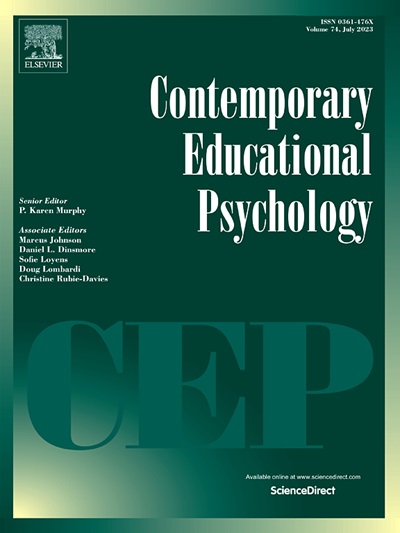“Only some can succeed here”: A mixed methods study of how faculty unproductive mindsets relate to gender, racial, and first-gen representation in higher education
IF 3.8
1区 心理学
Q1 PSYCHOLOGY, EDUCATIONAL
引用次数: 0
Abstract
Gender, racial/ethnic, and socioeconomic disparities pervade academia. Though there are a wealth of established reasons for these gaps, recent research has begun to examine how faculty beliefs contribute to representation outcomes for groups stereotyped as lacking intelligence. Extending prior research and using a sequential explanatory mixed methods approach, the present study investigates how field-specific ability beliefs (beliefs about the importance of brilliance) and fixed mindsets (beliefs about the immutability of intelligence) relate to the representation of women, racial/ethnic minorities, and first-generation students at various levels of academia. In the quantitative phase with 1,025 faculty from 83 departments, self-reported beliefs exhibited negative correlations with representation outcomes in the small to very large range (−.16 > r’s > -0.44). Qualitative findings, however, suggest a more complicated relationship. Focus group data from undergraduate and graduate students in two departments differing in faculty beliefs (N = 32), suggested that both explicit and implicit messages from professors, peers, and the learning environment are important contributors to students’ experiences, beliefs, and decisions. The findings call for more intentional considerations, both in research and in practice, of the messages students receive from the environments in which they learn.
"只有一部分人能在这里取得成功":关于教师的非生产性心态如何与高等教育中的性别、种族和第一代代表性相关的混合方法研究
学术界普遍存在性别、种族/民族和社会经济差距。虽然造成这些差距的既定原因很多,但最近的研究已开始探讨教师的信念如何影响被刻板地认为缺乏智力的群体的代表性结果。本研究扩展了之前的研究,并采用了一种顺序解释混合方法,调查了特定领域的能力信念(关于聪明重要性的信念)和固定心态(关于智力不可改变的信念)与女性、种族/少数民族和第一代学生在各级学术界的代表性之间的关系。在对来自 83 个院系的 1,025 名教师进行的定量研究中,自我报告的信念与代表性结果在小到很大的范围内呈现负相关(-.16 > r's >-0.44)。然而,定性研究结果表明两者之间的关系更为复杂。来自两个系的本科生和研究生的焦点小组数据(N = 32)表明,来自教授、同学和学习环境的显性和隐性信息对学生的经历、信念和决定都有重要影响。这些研究结果要求在研究和实践中更有意识地考虑学生从学习环境中接收到的信息。
本文章由计算机程序翻译,如有差异,请以英文原文为准。
求助全文
约1分钟内获得全文
求助全文
来源期刊

Contemporary Educational Psychology
PSYCHOLOGY, EDUCATIONAL-
CiteScore
16.50
自引率
3.90%
发文量
74
期刊介绍:
Contemporary Educational Psychology is a scholarly journal that publishes empirical research from various parts of the world. The research aims to substantially advance, extend, or re-envision the ongoing discourse in educational psychology research and practice. To be considered for publication, manuscripts must be well-grounded in a comprehensive theoretical and empirical framework. This framework should raise critical and timely questions that educational psychology currently faces. Additionally, the questions asked should be closely related to the chosen methodological approach, and the authors should provide actionable implications for education research and practice. The journal seeks to publish manuscripts that offer cutting-edge theoretical and methodological perspectives on critical and timely education questions.
The journal is abstracted and indexed in various databases, including Contents Pages in Education, Australian Educational Index, Current Contents, EBSCOhost, Education Index, ERA, PsycINFO, Sociology of Education Abstracts, PubMed/Medline, BIOSIS Previews, and others.
 求助内容:
求助内容: 应助结果提醒方式:
应助结果提醒方式:


